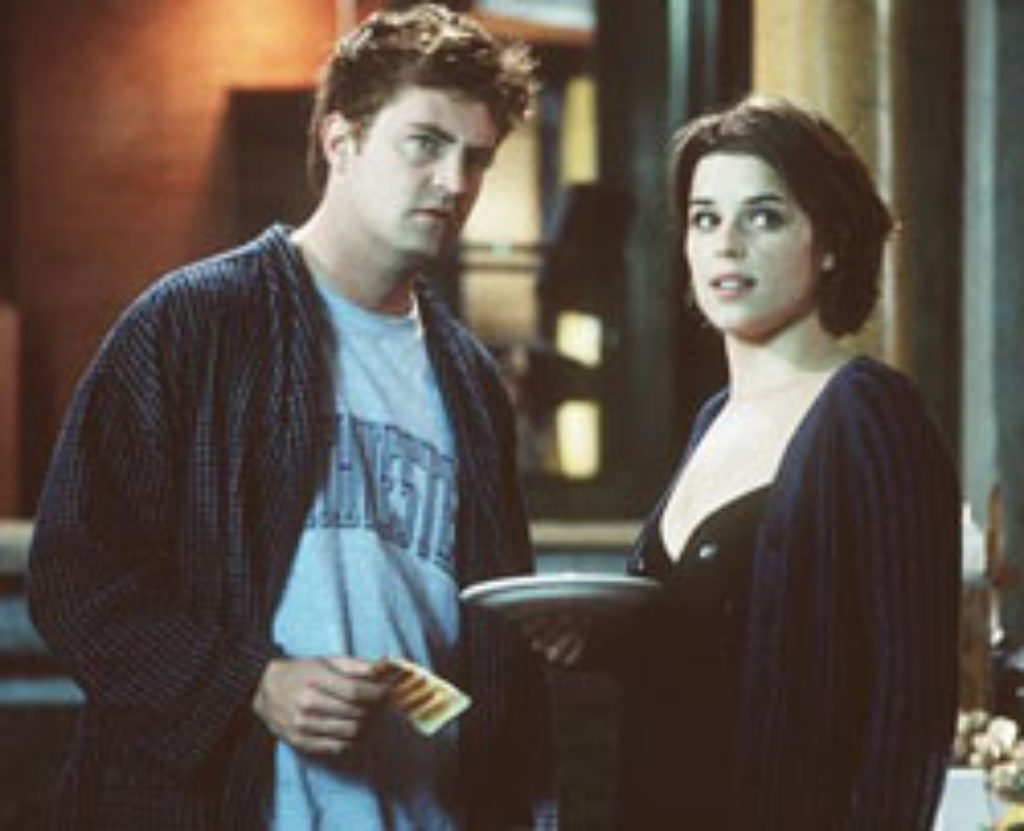
Chicago tycoon Charles Newman has a high-society wife and a puckish young mistress, an artist named Amy. The adulterer’s jealousy inspires him to enlist budding architect Oscar Novak—whom he mistakenly believes to be gay—to keep an eye on Amy and report back any extracurricular social activity. Oscar can’t really refuse since he and his genuinely gay business partner, Peter, are competing with a rival firm for a multi-million-dollar contract to be personally awarded by Newman. Naturally, Oscar develops feelings for Amy. Of course, she, too, is under the false impression that he is gay. Oscar and Amy strike up a friendship that gets more and more complicated when he, at first willing for a few people to misconstrue his sexuality in the interest of dating Amy and winning the contract, is “outed” on the front page of the Chicago Tribune and subsequently honored as the city’s Gay Professional of the Year. What a mess. The conclusion is painfully predictable. Oscar announces his straightness and his love for Amy in the most uncomfortably public way possible. She proceeds to chew him out about honesty and friendship. She forgives. They kiss. THE END. But in the 100 minutes prior, viewers are assaulted by crass language and sexually charged humor built around mistaken sexual identity.
Positive Elements: There are messages about the need for honesty in relationships. Girls describe how insulting it feels to be hit on and ogled by men.
Spiritual Content: Charles keeps a Buddha in his office and jests about relying on it for spiritual wisdom.
Sexual Content and Nudity: Stabs at humor frequently involve lewd double entendres and confusion over Oscar’s sexuality. A gay stranger on a bus makes unwanted advances toward Oscar, as does a muscle-bound football player who exists solely to make audiences second-guess gay stereotypes. Descriptions of sex and anatomy get pretty graphic for a PG-13 rating. Amy asks her “gay” friend, “What are your thoughts on penis size,” then talks about male fantasies and her own lesbian encounter while Oscar sits, riveted (“You know how it is in college; we experimented”). Oscar and his football buddies chat about unconventional sex, bondage and more. Men are shown in bed together. Oscar accidentally interrupts a gay dinner party and vents to Peter about his growing predicament, embarrassed to have people think he’s gay, but adamant that he has no problem with the lifestyle (“I’m all for homosexuality. Especially when it happens between two gorgeous women—or three”). Oscar jokes about sneaking off to have anonymous sex with straight women at straight bars. Casual conversation implies that any couple “going together” is also a couple “sleeping together.” In fact, Amy’s way of letting Oscar know all is forgiven and they’re about to become a couple is by staking claim to the left side of the bed. An art exhibit shows photographs of people’s bare backsides with flags of the world painted across their buttocks. To cover for an awkward situation, Peter quips, “Oscar is omnisexual. He swings every which way.” At the end of the film, Peter and the football player slip off for a couple of drinks and, presumably, more. Amy’s cavalier attitude toward adultery is equally disturbing. And until Oscar feels Charles is taking advantage of Amy, he seems morally ambivalent to their affair as well.
Violent Content: In anger, Amy punches both Oscar and Charles in the face. There’s also a lot of slapstick humor (Amy accidentally whacks Oscar in the head and groin during their first date; a man is shocked when his radio falls in the tub; taxi engine explodes in Oscar’s face; etc.).
Crude or Profane Language: Exclamatory profanities—including blasphemous uses of Christ’s name—mar the dialogue. Anatomical slang sinks to the level of having one man repeatedly defined by the size of his penis. There’s also one f-word.
Drug and Alcohol Content: On separate occasions, characters down beers at a bar, share a bottle of champagne and guzzle margaritas. After running into Charles’ wife for the first time, Amy tells Oscar she wants to go to a bar and get drunk (they proceed to knock down mixed drinks).
Other Negative Elements: Three people are shown vomiting on the sidewalk. Amy is shown in low-cut dresses, underwear and other immodest clothing.
Summary: Three to Tango celebrates sexual immorality in various forms. Adultery. Homosexuality. Premarital sex. It’s hard to root for teen idols Perry (playing a slumping skirt-chaser) and Campbell (whose character knowingly beds another woman’s husband) to find happiness together. The filmmakers give thanks to the Gay & Lesbian Alliance Against Defamation (GLAAD) for its support. The input is obvious. Like In & Out, this mainstream comedy has a clear agenda: destigmatize and generate greater acceptance for the gay lifestyle. Three to Tango strings together a series of gender identity misunderstandings and loaded diatribes about gay pride that give virtually every supporting character an excuse to say how “okay” they are with homosexuality. Families should resist this unfunny, often lewd propaganda.
